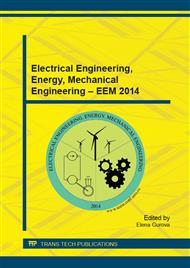[1]
O.M. Alifanov, Inverse Heat Transfer Problems, Springer-Verlag, Berlin (1994).
Google Scholar
[2]
Yu.M. Matsevity, Inverse Heat Conduction Problems: in 2 vol., Vol. 1, Methodology/ Yu.M. Matsevity: NAS of Ukraine, Institute for Problems in Mechanical Engineering, Kyiv, (2008).
Google Scholar
[3]
J.V. Beck, B. Blackwell , C.R. St. Clair, Inverse Heat Conduction: Ill- posed Problems, J. Wiley & Sons, New York, (1985).
Google Scholar
[4]
J. R. Cannon, P. DuChateau, Structural identification of an unknown source term in a heat equation, Inverse Problems 14 (3) (1998) 535–551.
DOI: 10.1088/0266-5611/14/3/010
Google Scholar
[5]
Zh. Yi, D. A. Murio, Source term identification in 1-D IHCP, Computers & Mathematics with Applications 47 (12) (2004) 1921–(1933).
DOI: 10.1016/j.camwa.2002.11.025
Google Scholar
[6]
E. G. Savateev, On problems of determining the source function in a parabolic equation, Journal of Inverse and Ill-posed Problems 3 (1) (1995) 83-102.
DOI: 10.1515/jiip.1995.3.1.83
Google Scholar
[7]
Y. Fan, D. G. Li, Identifying the Heat Source for the Heat Equation with Convection Term, Int. Journal of Math. Analysis 3 (27) (2009) 1317–1323.
Google Scholar
[8]
Xiuming Li, Suping Qian, Numerical Solution of the Inverse Problem of Determining an Unknown Source Term in a Heat Equation, Journal of Applied Mathematics 2012 (2012).
DOI: 10.1155/2012/390876
Google Scholar
[9]
A.G. Fatullayev, Numerical method of identification of an unknown source term in a heat equation, Mathematical Problems in Engineering. Theory, Methods and Applications 8 (2) (2002) 161–168.
DOI: 10.1080/10241230212907
Google Scholar
[10]
A.G. Fatullayev, E. Can, A. Halici, The TTF method for the inverse problem of finding unknown source function in a heat equation. Journal of Computational Analysis and Applications 11 (2) (2009) 322-327.
Google Scholar
[11]
F. Geng, Y. Lin, Application of the variational iteration method to inverse heat source problems, Comput. Math. Appl. 58 (2009) 2098–2102.
DOI: 10.1016/j.camwa.2009.03.002
Google Scholar
[12]
S. Beddiaf, L. Autrique, L. Perez, J-C Jolly, Heating sources localization based on inverse heat conduction problem resolution, 16th IFAC Symposium on System Identification, 11-23 July (2012), Brussels, Belgium.
DOI: 10.3182/20120711-3-be-2027.00171
Google Scholar
[13]
C. Le Niliot, F. Lefèvre, A method for multiple steady line heat sources identification in a diffusive system: application to an experimental 2D problem, International Journal of Heat and Mass Transfer 44 (2001) 1425 – 1438.
DOI: 10.1016/s0017-9310(00)00184-8
Google Scholar
[14]
L. Autrique, N. Ramdani, S. Rodier, Mobile source estimation with an iterative regularization method, 5th International Conference on Inverse Problems in Engineering: Theory and Practice, Cambridge, UK, 11-15 July (2005), 1, pp A08.
Google Scholar
[15]
A. Farcas, D. Lesnic, The boundary-element method for the determination of a heat source dependent on one variable, Journal of Engineering Mathematics 54 (4) (2006) 375–388.
DOI: 10.1007/s10665-005-9023-0
Google Scholar
[16]
T. Johansson, D. Lesnic, Determination of a space wise dependent heat source, Journal of Computational and Applied Mathematics 209 (2007), 66-80.
DOI: 10.1016/j.cam.2006.10.026
Google Scholar
[17]
L. Yan, C. L. Fu, F. L. Yang, The method of fundamental solutions for the inverse heat source problem, Engineering Analysis with Boundary Elements, 32 (3) (2008) 216-222.
DOI: 10.1016/j.enganabound.2007.08.002
Google Scholar
[18]
A.D. Klose, V. Ntziachristos, A.H. Hielscher, The inverse source problem based on the radiative transfer equation in optical molecular imaging, Journal of Computational Physics 202 (2005) 323 – 345.
DOI: 10.1016/j.jcp.2004.07.008
Google Scholar
[19]
A.A. Burykin, A.M. Denisov, Determination of the unknown sources in the heat-conduction equation, Computational Mathematics and Modeling, 8 (4), 309–313, (1997).
DOI: 10.1007/bf02404048
Google Scholar
[20]
A.J. Silva Neto, M.N. Özisik, The estimation of space and time dependent strength of a volumetric heat source in a one-dimensional plate, International Journal of Heat and Mass Transfer 37 (6) (1994) 909 – 915.
DOI: 10.1016/0017-9310(94)90216-x
Google Scholar
[21]
M. Yun-Jie, F. Chu-Li, Z. Yuan-Xiang, Identification of an unknown source depending on both time and space variables by a variational method, Applied Mathematical Modelling, 36 (10), (2012), 5080 – 5090.
DOI: 10.1016/j.apm.2011.12.046
Google Scholar
[22]
W. H. Ray, Advanced Process Control, McGraw-Hill, New York (1981).
Google Scholar


